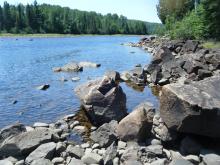Research
Research > Themes >
Theme 1: Ecosystemic Analysis of productive capacity of fish habitats in rivers
 Increased energy demand, trade of peak priced hydro and integration of other renewable energy sources all contribute to the expansion of hydropower operations in Canada as well as more flexible operation of hydropower systems. The research in this theme focuses on impacts of hydropower generation on rivers and the changes to living conditions for fish and their habitat.
Increased energy demand, trade of peak priced hydro and integration of other renewable energy sources all contribute to the expansion of hydropower operations in Canada as well as more flexible operation of hydropower systems. The research in this theme focuses on impacts of hydropower generation on rivers and the changes to living conditions for fish and their habitat.
There is a great need to accurately analyse and predict the impacts, define tolerance levels and find cost effective mitigation strategies. Projects in this theme address the lack of consensus regarding the methods and the metrics that should be used to estimate the Productive Capacity of Fish Habitat (PCFH) on a routine basis, as well as the variables that should be used to predict the effects of hydropower on PCFH with sufficient statistical precision.
Key objectives:
- to assess the relationship between indices of the productive capacity of fish habitats (PCFH; catch per unit effort, density, biomass, etc.) and large-scale environmental conditions (nutrients, water temperature, geomorphology, etc.) in rivers with average annual discharge less than 300 m3/s ;
- to compare such relationships among types of ecosystems (regulated and unregulated rivers);
- to identify the environmental conditions that explain a significant proportion of the variations in indices of PCFH either within or among types of ecosystems; and
- to unveil the effect of environmental conditions (many affected by hydropower) on key biological attributes such as egg survival, fish growth, food web structure, and fish passage.
The research program is organized around four components:
